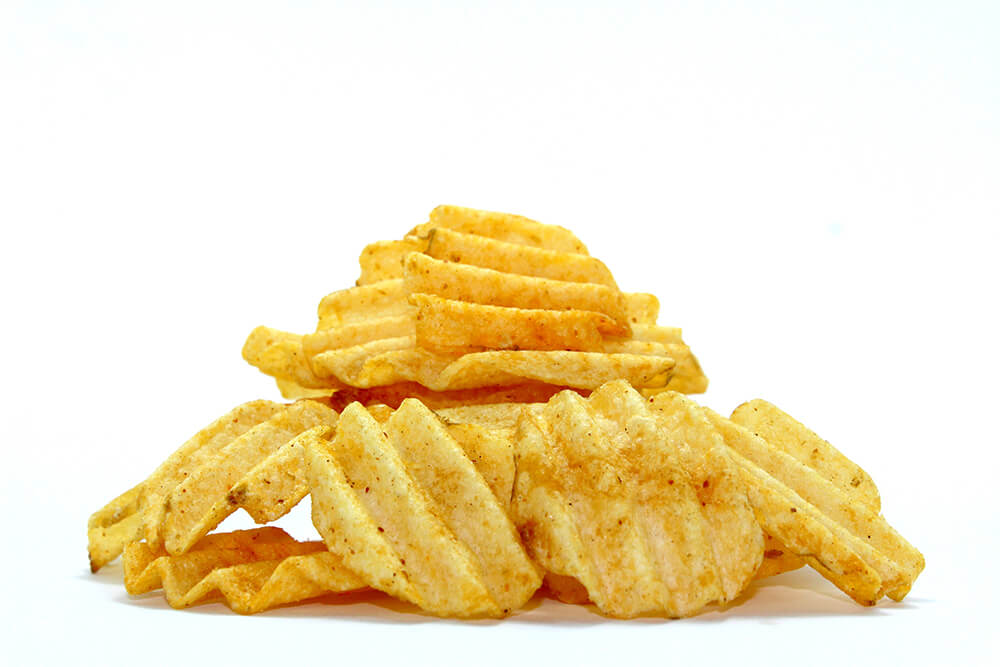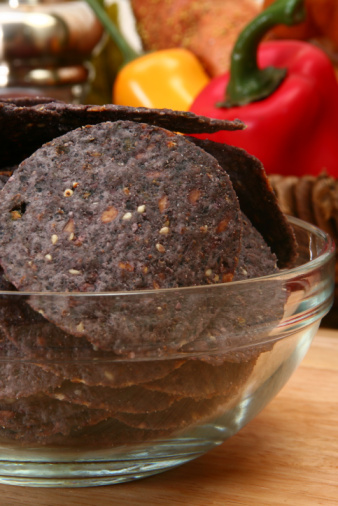
Many people think that veggie chips are more nutritious than potato chips, but this is not true. Veggie chips are high in calories and sodium, and they contain almost as much fat as regular potato chips. People who want to consume veggie chips that have higher amounts of nutrients and fiber should choose Terra chips. For lower calorie and fat content, the best options are veggie chips from Robert’s American Gourmet and baked veggie chips. Those who want low-sodium chips should go for Terra veggie chips or salt-free veggie chips.
Veggie chips are a great snack, and they come in a wide variety of delicious flavors. However, they do not offer a lot of health benefits. Most manufacturers of veggie chips claim that their products are made with fresh vegetables, but if you look closely to the first few and main ingredients in most veggie chips, you will find that corn flour or potatoes, processed oils, food coloring, salt additives take up the supposedly “vegetable” spots and one small amount of vegetable powder or puree is used. Also, labels reveal that veggie chips contain high amounts of calories, salt and fats, and little else that is beneficial to health. However, there are a number of veggie chip products that do provide some benefits.
The traditional potato chip is fried in oil, but for a healthier option, look for baked varieties. This lighter choice imparts a similar taste and satisfying crunch compared to the average chip, but it will have less fat and grease residue on your hands. For the best way to satisfy that potato chip craving, you can make baked potato chips at home, and control the amount of salt, fat and additional flavorings in each batch.
One serving (28 grams) of veggie chips contains 120 calories, of which 36 calories are from fat. The total amount of carbohydrates present is 19 grams, which makes up 6% of the recommended daily consumption of carbohydrates. Veggie chips also have high sodium content, with one serving containing 250 milligrams or 10% of one’s recommended daily value. Their total fat content is 4.0 grams, which represents 6% of the daily value, and the amount of saturated fat is 0.5 grams or 3% of the daily value. Veggie chips provide 1 gram of fiber, which is 4% of the daily value, and 1 gram of protein. Most veggie chip products do not contain any vitamins or minerals, except for a small amount of iron.

Raw vegetables are great sources of vitamins A and C, but the vitamins are lost during the process of making veggie chips. Whole vegetables are converted to vegetable powder or puree first, and then the powder or puree is fried to make veggie chips. Since little vegetable powder or puree will remain in the final product, no vitamin will be left in the veggie chips. However, there are certain veggie chip products, such as Terra, that contain small amounts of vitamins A and C and are made from slices of vegetables. Potato chips that are made from potato slices provide moderate amounts of vitamin C.
Most veggie chips do not provide any calcium at all, but they do have a modicum of iron. Garden veggie chips offer 2% of the recommended daily value for iron.
Fiber is present in all veggie chips, but only in low amounts. While most veggie chips contain 1 or 2 grams of fiber, Terra vegetable chips have 3 grams.
The Lay's brand of baked potato chips has 120 calories per 1-oz. serving. This amount works well as a snack -- The Diet Channel advises eating snacks that contain 100 to 200 calories to lessen hunger pangs, which helps prevent overeating at your next meal. Eating a serving of these chips adds 2 g of fat to your meal plan compared to the 7 g of fat in a serving of regular potato chips. An ideal intake of fat ranges from 20 to 35 percent of the calories in your diet.
A serving of baked potato chips has 23 g of carbohydrates, or 7 to 10 percent of the carbs you should consume each day for energy and to keep your central nervous system functioning. A type of carbohydrate not used for these purposes is fiber, and you'll take in 2 g of this nutrient in each portion of chips. The fiber in baked chips helps prevent diarrhea and constipation when consumed in adequate levels for your body; your meal plan should include 25 to 38 g per day, although drinking enough water is critically important when consuming fiber. You also get 2 g of protein in each serving of baked potato chips, but you'll need quite a bit more to reach your nutritional needs -- generally 46 to 56 g daily.
Kettle Brand prides itself in using all natural ingredients that are GMO free. They don’t use a lot of unnecessary ingredients in their chip varieties, and the chips they produce are light and crisp. Many different flavors including barbeque, jalapeño, cheddar, sour cream and chive, among others, are available at competitive prices in most supermarkets and health foods store.
As with the Baked Lays, just because these are better for you than fried chips doesn’t mean you can eat an unlimited number without having to worry about your waist line.
Potatoes got a bad reputation due to the popularity of low-carb diets because they are high in starchy carbohydrates and low in protein. That doesn't mean that potatoes are bad for you. It is super low in saturated fats, and does not because the body systems to become inflamed after eating it like meats and processed foods do.
Though eating baked potato chips from a white potato may give you a tiny boost in the vitamin C, and smidgen of calcium, substituting sweet potato for the white variety are a much better choice and gives you almost a full day’s worth of beta carotene, vitamin A, C, a quarter of the daily B complex intake and tons of fiber.
Too-high salt intake contributes to high blood pressure and heart disease, so carefully monitor the salt in your diet, aiming for an intake of no more than 2,300 mg if you are healthy or 1,500 mg if you have hypertension or heart problems. While the 180 mg of sodium per serving of chips may not seem like much, if you eat more than 1 oz. of baked potato chips, this amount can add up quickly. If you make this snack at home, consider using salt substitutes to cut down on the amount of sodium.
White potatoes are generally good for you as long as you prepare them in a healthy manner. Boiled and baked potatoes are the best options for preparation. French fries and potato chips are the worst.
Besides having extra fat added to them, potatoes that are fried as chips or French fries may contain acrylamide. This is a toxic substance that forms in starchy foods when they are processed or cooked at high temperatures.
Acrylamide has been shown to cause cancer in lab animals, but we don't know exactly what levels of acrylamide exposures are dangerous for humans. Frying and baking at high temperatures for a long time result in the highest levels of acrylamide, however, those levels may be reduced when potatoes are boiled first or treated with antioxidant solutions.
Potatoes are a good source of vitamins, minerals and fiber, but remember to eat the skin after a good scrubbing.
One medium plain potato has about 150 calories so you have to keep that in mind if you are watching your weight. Potatoes are often served with high-calorie and high-fat toppings like butter, sour cream or gravy that may add a lot more calories and unhealthy fats.
Potatoes may also contain another chemical called solanine. When potatoes have a green tint to their skin, they may actually have a sun-burn. Potato tubers grow underground and if they are exposed to light, they develop a green tint due to chlorophyll production which normally happens in the stems and the leaves, but not in the tubers.
The chlorophyll is harmless, but the light exposure also causes the potatoes to develop a higher level of an irritating chemical call solanine. This causes the potatoes to taste bitter and some who people claim to be sensitive to solanine believe they may feel increased arthritis type pain.
While the association between arthritis pain and solanine from dietary sources remains unproven, research does show that solanine may adversely affect the cells that make up the lining of the intestines and could possibly irritate inflammatory bowel disorders. To avoid solanine, don't buy potatoes that have green skin and store them in a dark place in your pantry or kitchen.
✮ Serve boiled potatoes with salsa or some broccoli and sprinkle about one ounce of shredded cheese on top.
✮ Make mashed potatoes with low-fat sour cream, skim milk and chives or mix in steamed and mashed cauliflower for more vitamins, fiber and a creamy sweet texture.
✮ Potatoes cooked in the microwave do not contain acrylamides. Cook them on high for 2 minutes and then take them out of the microwave, wrap them in foil and let stand for 5 minutes (as they will continue to cook).
✮ Add potato slices (with skins) to soups and stews.
You can easily make your own chips at home which will actually save you money, fat and calories. Unlike the commercially produced variety, homemade potato chips can be done without the use of a lot of oil. In fact, to really keep the fat in check, consider using a spray instead. Cut your potatoes into thin slices and then spread them on a baking sheet. Lightly spray the tops of each potato and then sprinkle your favorite flavors on such as salt, pepper, cayenne pepper, parmesan cheese or even fresh herbs.
Bake your potatoes in the oven at 300 degrees for 5 minutes, then take then out and flip them over. Lightly spray them with oil, sprinkle them with the spices you used on the other side, and then put them back in the oven until they’re almost completely crisp and light brown. As they cool, they will crisp up even more, creating a great baked chip you can enjoy anytime without all the fat and calories of the options you will find on the market.
If you want to make a tasty treat that’s even healthier than baked chips, consider experimenting with different vegetables such as sweet potatoes, carrots and parsnips and bake them as you would potatoes. You’ll find that many root vegetable make great chips that can be used with dips and dressings just as potato chips.
Sources: Livestrong.com, MSNBC.msn.com, NPR.org, FoodNetwork.com
